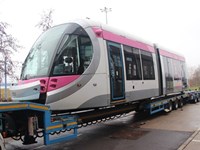
A Midland Metro tram is in Spain to be fitted with hi-tech batteries allowing it to run without the need for overhead power cables.
Tram 18 was split in two and loaded on to flatbed lorries to make the journey from the Metro depot in Wednesbury to the factory in Zaragoza, Spain, where it was made.
Tram manufacturer CAF will then fit the Urbos 3 with two lithium ion cells and undertake exhaustive tests before returning it to the UK in the autumn.
Further tests will then be carried out at the Metro depot before work begins there on fitting out the rest of the 21-tram fleet.
The Midland Metro will be the first commercial tram system in the UK to have catenary-free running, allowing the trams to operate over short distances without the need for overhead cables and equipment.
The batteries remove the need for overhead lines and equipment which would have marred the architecturally sensitive area around Birmingham’s historic town hall in Victoria Square.
The batteries have been commissioned by the West Midlands Combined Authority (WMCA), which owns the Midland Metro system.
Cllr Roger Horton, lead member for rail and Metro on the WMCA’s transport delivery committee, said:
“It’s a major milestone for the Metro as it will be the first system in the UK to have catenary-free running.
“Battery technology is now so developed we can use it to get the tram through sensitive areas and overcome what would otherwise be expensive infrastructure works.
“This has got be good news as the Midland Metro continues to expand and provide an effective alternative to the private car, helping to ease congestion and support economic growth.”
The total cost of fitting out the fleet will be a one-off sum of £15.5m but will save £9.24m on infrastructure costs on the first four tramline extensions.
Urbos 3 trams already run catenary-free along some sections of the tram networks in the Spanish cities of Zaragoza, Seville and Cadiz.
The newly available lithium ion batteries will be fixed on the tram roof and recharged by overhead lines along other parts of the route.
About First Group
First Group operates five divisions which draw on common skills and expertise, but which are varied by geography, customer base and a mix of contract and passenger revenue. Their broad footprint in the UK and North America gives us experience of two of the most developed markets in the world for transport services, and a breadth of expertise across different regulatory and contractual environments.




Comments
There are no comments yet for this item
Join the discussion